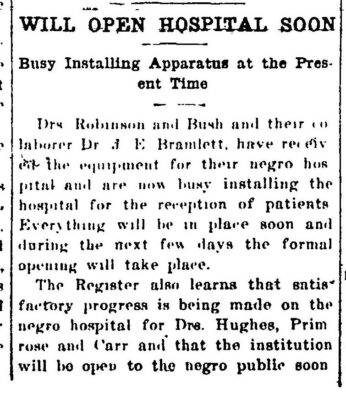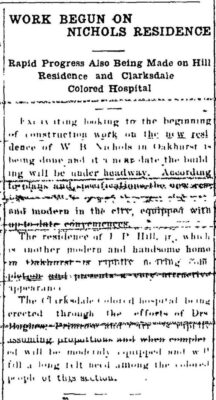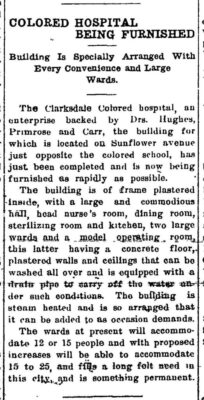Research is Respect
Mt. Zion Memorial Fund joins forces with the Riverside Hotel African American Historic Preservation Center

Documenting African American History in Clarksdale
The Mt. Zion Memorial Fund for Blues, Music, and Justice (MZMF) entered into an agreement in 2024 with the Riverside Hotel African American Historic Preservation Center (RHAAHPC) to conduct historical research and further document the historical significance of perhaps the most important blues tourist site and blues tourism broker in Clarksdale—the Riverside Hotel, Mrs. Z.L. Hill, and her son, Frank Ratliff.


The Riverside Hotel African American Historic Preservation Center is part of the African American Civil Rights Network along with the Lorraine Motel, Little Rock Central High School, Medgar and Myrlie Evers Home National Monument, the Sixteenth Street Baptist Church, the Selma to Montgomery National Historic Trail, and the Mississippi Delta National Heritage Area.
The Riverside Hotel “was dreamed up, owned, and operated by an entrepreneurial African American woman, Mrs. Z. L. Hill,” during ther racially segregated Jim Crow–era in Mississippi in 1944, and it “provided safe lodging in the Delta for some of the most famous musicians in history as well as like-minded folk.” As one of the few African American hotels in Mississippi during Jim Crow, it was listed in the Green Book and played host to a Who’s Who of historic Black artists including Sonny Boy Williamson II, Muddy Waters, and Robert Nighthawk. Others, like Howlin’ Wolf, Sam Cooke and Ike Turner, made the Riverside Hotel their home away from home as they toured and crisscrossed the South.
The Riverside Hotel was the place “where Blues Gave Birth to Rock and Roll.” Rocket 88–considered to be the first Rock N Roll song ever, was written and rehearsed at the Riverside Hotel by Ike Turner, Jackie Brenston, and Raymond Hill.
Prior to becoming the Riverside Hotel, the property opened on July 12, 1916 as the Clarksdale Colored Hospital and served the African American community until 1942. In 1937, “Empress of the Blues” Bessie Smith died in the hospital, after being seriously injured in a car wreck while traveling between shows.
In 2021, the National Trust for Historic Preservation added the Riverside Hotel to its list of one of the most endangered sites in America. In 2021, the City of Clarksdale proclaimed the Riverside Hotel as the place where blues gave birth to rock and roll. In 2022, the Riverside Hotel was awarded a $499,500 NPS African American Civil Grant towards the restoration and preservation of the hotel and the adjacent shotgun houses, and participated in the Smithsonian Institution’s traveling Green Book Exhibition. The hotel is one of only a few structures in America today that was in the Green Book and still in operation. In 2023, the hotel was added to the prestigious National Parks Service African American Civil Rights Network acknowledging its impact upon Civil Rights. The need to further preserve its history, was recently recognized by the Association of African American Museums in providing a grant to undertake research, documentation and creation of a library. In addition, the Mississippi Delta National Heritage Area provided a grant to establish an interpretive center within the hotel.
Mrs. Z.L. Hill’s granddaughters, Sonya Gates and Zelena Ratliff, are working to ensure that their family’s legacy and the hotel’s legacy are preserved for generations to come. The ability to restore and eventually re-open the hotel is critical not only to the Ratliff family, but the community at large and Mississippi. For more information on the Riverside Hotel’s rich legacy and to learn about the Ratliff Family and their family’s fight to save, restore and preserve this valuable and irreplaceable African American landmark, please visit their website HERE


Community Scanning Days
MZMF plans to hold Community Scanning Days on May 11 & 12 from 10am to 7pm at the Delta Blues Alley Cafe at 352 Delta Ave, Clarksdale, MS 38614. We invite anyone who wants to digitally preserve their photographs, documents, or other media to visit us. MZMF will have several scanning stations setup to digitize the items, and we will return the originals. WE WILL NOT KEEP ANY OF THE MATERIAL. We simply want to help preserve your local history.
MZMF also hopes to identify people in the larger community with information and media about the hotel and hospital. So please tell everyone you know who might contribute to the project to visit us on those days in Clarksdale.


During this project, MZMF intends to accomplish several goals and provide a solid foundation upon which to expand research efforts in the future.
1) Process and inventory all historical artifacts and manuscripts pertaining to the hotel. MZMF will rehouse all historical manuscripts in acid-free folders as well as reach out to the community to solicit donations of other photographs, manuscripts, and other media.
2) Conduct interviews with family members, community members, local people, blues, and civil rights enthusiasts.
3) Build upon, organize, and process the prodigious amount of research already done about the Riverside Hotel by 1) compiling a bibliography of secondary sources about the Black experience in the Delta, 2) compiling an annotated bibliography of sources containing interviews with Z.L. Hill and Frank Ratliff, and 3) visiting local libraries, state archives, and courthouses to compile lists of additional sources that contain information on the hotel.
4) Compose a chronological biography of Z.L. Hill and her son, Frank Ratliff.
5) Meet with various stakeholders to conduct interviews and digitize primary source material
6) Conduct archival research and documentation to tell the story about the hospital including but not limited to creating a digital archive of African American death certificates of those who passed when it was a hospital.
WE NEED YOUR HELP!
We hope to document as thoroughly as possible the history of the Riverside Hotel, and we need to interview people about their experiences staying at the hotel and interacting with Ms. Z.L. Hill and her son Frank Ratliff. We also need to know who stayed or visited the hotel and the Subway Lounge. Please, anyone with any knowledge of this historic business in Clarksdale, we would love to interview you for this project.
We also hope to preserve any audio, video, or photographs of the hotel. We are willing to digitize any existing archival media and return the original media to the owners.
Oral History
MZMF plans to conduct a series of interviews with various stakeholders about the hotel. If you or anyone that you know has information about the Riverside Hotel that should be part of the historical record, please reach out to the project coordinator Shannon Evans on Facebook or email her at [email protected]
She will schedule a time to meet with you in person, over the phone, or on Zoom.

MZMF Mission
To prevent the erasure of cultural resources in African American communities by promoting the responsible practice of public history and heritage tourism.
MZMF Vision
We envision communities where people reach a consensus about the past, understand its nuance and complexity, and bring their curiosity about history to bear on the world.
Inventory and Processing the Collections
a. MZMF will rehouse documents, photographs, and other items into archival quality (acid-free) folders and boxes. This will coincide with the inventory process. As we take a full inventory of the manuscripts, we will replace existing containers with archival quality boxes and create a processing plan for the collection.
b. MZMF will use item-level processing—a thorough process of taking inventory and rehousing the collection. We take each document, place it inside its own folder, and label the folder so that it can be easily retrieved later. Processing can also be done with less detail depending on time and funding constraints.
c. MZMF will create a finding aid for the collection. Finding aids are a compilation of all the text labels on the folders inside a single document, which lets people know what is inside the collection.

Bessie Smith Room
On September 26, 1937, legendary recording artist Bessie Smith was seriously injured in an automobile accident near Clarksdale on Highway 61. An ambulance carried Smith to the African American Hospital in Clarksdale, where doctor’s amputated her right arm. Yet, she died that morning without ever regaining consciousness. The hospital closed a few years later and was re-opened as a hotel.




![RH sign old The original sign at the Hotel [Photo ©️ T. DeWayne Moore 2024]](https://i0.wp.com/mtzionmemorialfund.com/wp-content/uploads/2024/03/RH-sign-old-1024x768.jpg?resize=640%2C480&ssl=1)
![RON AND TDM Ron Woywitka and Dr. DeWayne Moore in February 2024 [Photo ©️ T. DeWayne Moore 2024]](https://i0.wp.com/mtzionmemorialfund.com/wp-content/uploads/2024/03/RON-AND-TDM-1024x768.jpg?resize=640%2C480&ssl=1)
![RH shotgun One of several shotgun houses on the property [Photo ©️ T. DeWayne Moore 2024]](https://i0.wp.com/mtzionmemorialfund.com/wp-content/uploads/2024/03/RH-shotgun-1024x768.jpg?resize=640%2C480&ssl=1)
![RH shotgun2 Another shotgun house on the property [Photo ©️ T. DeWayne Moore 2024]](https://i0.wp.com/mtzionmemorialfund.com/wp-content/uploads/2024/03/RH-shotgun2-1024x768.jpg?resize=640%2C480&ssl=1)


![RH closet3 The unprocessed archive of historic artifacts and manuscripts [Photo ©️ T. DeWayne Moore 2024]](https://i0.wp.com/mtzionmemorialfund.com/wp-content/uploads/2024/03/RH-closet3-1024x768.jpg?resize=640%2C480&ssl=1)
![RH closet The unprocessed archive of historic artifacts and manuscripts [Photo ©️ T. DeWayne Moore 2024]](https://i0.wp.com/mtzionmemorialfund.com/wp-content/uploads/2024/03/RH-closet-1024x768.jpg?resize=640%2C480&ssl=1)
![RH cert Many of the historic manuscripts on the wall [Photo ©️ T. DeWayne Moore 2024]](https://i0.wp.com/mtzionmemorialfund.com/wp-content/uploads/2024/03/RH-cert-1024x768.jpg?resize=640%2C480&ssl=1)
![RH CERT2 Many of the historic manuscripts on the wall [Photo ©️ T. DeWayne Moore 2024]](https://i0.wp.com/mtzionmemorialfund.com/wp-content/uploads/2024/03/RH-CERT2-1024x768.jpg?resize=640%2C480&ssl=1)







